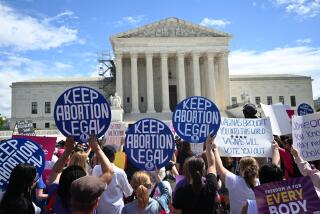Judges split over birth control coverage and religious liberty
WASHINGTON — Judges across the country are increasingly split over whether private employers and their companies can cite their religious beliefs as a valid reason for denying birth control coverage to their employees.
Earlier this month the Obama administration proposed a compromise for some nonprofit religious organizations, such as Catholic hospitals and colleges, that would allow them to avoid paying directly for such insurance. But the administration refused to consider a similar exemption for private, for-profit employers.
The growing legal dispute over paying for birth control is the latest in a long-running battle over how to weigh claims of religious liberty, one that has sometimes flipped the usual conservative-liberal divide.
Lawyers for the Obama administration rely heavily on an opinion by conservative Supreme Court Justice Antonin Scalia that rejected the notion that the Constitution’s protection for the “free exercise of religion” gives believers an exemption from some laws.
“The free exercise of religion means, first and foremost, the right to believe and profess whatever religious doctrine one desires,” Scalia wrote in a 1990 case in which two Native Americans claimed a right to use peyote in a religious ceremony. It is not, he said, “a private right to ignore generally applicable laws.”
“Any society would be courting anarchy,” Scalia continued, if people were free to ignore a “valid and neutral law … on the ground that [it] prescribes conduct that his religion proscribes.”
In the more than two decades since then, Scalia’s no-exemption rule has been cited widely by judges faced with claims based on religious liberty. Courts in California and several other states said Christian landlords could not refuse to rent to unmarried couples, despite their religious belief that cohabitation is a sin. The California Supreme Court relied on Scalia’s opinion in 2004 when it upheld a state law that required Catholic Charities to provide contraceptive coverage for their employees.
Meanwhile, conservative critics of Obama’s policy have turned to a congressional measure sponsored by the late Sen. Edward M. Kennedy, a liberal Democrat, that was designed to overturn Scalia’s opinion. The Religious Freedom Restoration Act of 1993 says the government may not “substantially burden a person’s exercise of religion,” except when doing so furthers “a compelling governmental interest.” The measure aimed to tip the scales of justice in favor of religious liberty claims, and it won the backing of interest groups from the right and the left.
While the Supreme Court later struck down Kennedy’s religious freedom act as it applied to the states, the 1993 law still applies to cases involving the federal government. And it has emerged at the center of the litigation over the so-called contraception mandate.
The Affordable Care Act requires employers with more than 50 employees to provide health insurance, and the Obama administration says an insurance plan must pay for basic preventive care, including contraceptives.
Since August, when the new rule went into effect, at least 48 lawsuits have been filed seeking religious exemptions to the contraception mandate, including by a Catholic family in Indiana whose large company makes parts for automobiles and who believe providing such coverage would be “sinful and immoral.” While these have been described as constitutional challenges, judges have focused on the federal law and asked whether paying for insurance puts a “substantial burden” on the employer’s religious faith.
The U.S. appeals courts in Chicago and St. Louis recently granted temporary exemptions for family-owned companies that sought religious exemptions. Meanwhile, the U.S. appeals courts in Denver and Cincinnati rejected similar claims from other employers. At every stage, the judges have been split.
Besides the cases brought by private employers, dozens of religiously affiliated employers, including schools and charities, have sued to seek an exemption from the contraceptive mandate. Judges are split on those cases as well, but the religious employers have won a majority of the preliminary decisions.
The Obama administration recently announced a compromise for nonprofit religious organizations, but New York Cardinal Timothy Dolan, president of the U.S. Conference of Catholic Bishops, said Friday it creates an unacceptable second-class status for religious hospitals, colleges and charities “rather than accepting the fact that these ministries are integral to our church and worthy of the same exemption as our Catholic churches.”
“Throughout the past year, we have been assured by the administration that we will not have to refer, pay for, or negotiate for the mandated coverage,” Dolan said in a statement. “We remain eager for the administration to fulfill that pledge and to find acceptable solutions.”
Legal experts who are tracking the case are as divided as the courts.
“I think the [religious freedom act] argument against the mandate is quite strong,” said Notre Dame Law School professor Richard Garnett. Judges will “quite rightly be reluctant to second-guess a claimant’s description” of sincerely held religious beliefs, he said.
But Marcia Greenberger, co-president of the National Women’s Law Center, said she found it “pretty shocking that a for-profit company can assert a religious belief to deny benefits to an employee.” She noted the Civil Rights Act of 1964 forbids employers from discriminating against workers in their pay or benefits because of religion.
It will likely be several months before an appeals court issues a final ruling and sends the issue to the Supreme Court.
More to Read
Start your day right
Sign up for Essential California for news, features and recommendations from the L.A. Times and beyond in your inbox six days a week.
You may occasionally receive promotional content from the Los Angeles Times.







